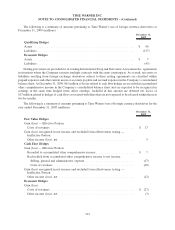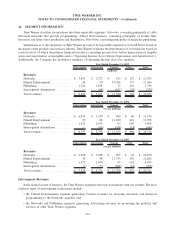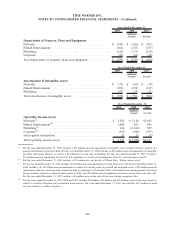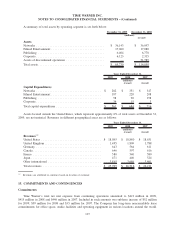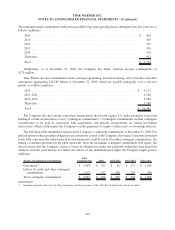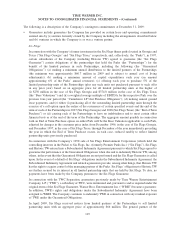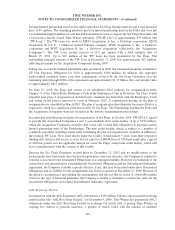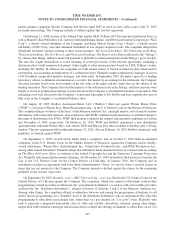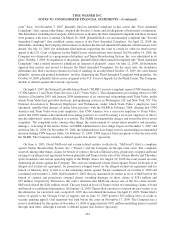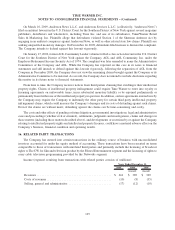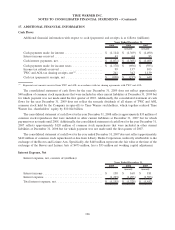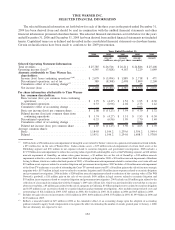Time Magazine 2009 Annual Report Download - page 135
Download and view the complete annual report
Please find page 135 of the 2009 Time Magazine annual report below. You can navigate through the pages in the report by either clicking on the pages listed below, or by using the keyword search tool below to find specific information within the annual report.partial summary judgment that the Company had filed in April 2007 as moot in view of the court’s July 27, 2007
reconsideration ruling. The Company intends to defend against this lawsuit vigorously.
On February 11, 2008, trustees of the Tolkien Trust and the J.R.R. Tolkien 1967 Discretionary Settlement Trust, as
well as HarperCollins Publishers, Ltd. and two related publishing entities, sued New Line Cinema Corporation (“NLC
Corp.”), a wholly owned subsidiary of the Company, and Katja Motion Picture Corp. (“Katja”), a wholly owned
subsidiary of NLC Corp., and other unnamed defendants in Los Angeles Superior Court. The complaint alleged that
defendants breached contracts relating to three motion pictures: The Lord of the Rings: The Fellowship of the Ring;
The Lord of the Rings: The Two Towers;andThe Lord of the Rings: The Return of the King (collectively, the “Trilogy”)
by, among other things, failing to make full payment to plaintiffs for their participation in the Trilogy’s gross receipts.
The suit also sought declarations as to the meaning of several provisions of the relevant agreements, including a
declaration that would terminate defendants’ future rights to other motion pictures based on J.R.R. Tolkien’s works,
including The Hobbit. In addition, the complaint set forth related claims of breach of fiduciary duty, fraud and for
reformation, an accounting and imposition of a constructive trust. Plaintiffs sought compensatory damages in excess
of $150 million, unspecified punitive damages, and other relief. In September 2009, the parties agreed to a binding
term sheet, subject to definitive documentation, to resolve this matter. In accounting for the settlement, the Company
allocated amounts based on its best estimate of the fair value of the rights and the claims that are the subject of the
binding term sheet. The Company allocated the majority of the settlement costs to the Trilogy, and these amounts were
largely accrued,as participation expense, in prior periods in the Company’s consolidated statement of operations. The
remaining costs were allocated to the Company’s contractual film rights to The Hobbit and were capitalized as part of
film costs in the Company’s consolidated balance sheet.
On August 18, 2009, Redbox Automated Retail, LLC (“Redbox”) filed suit against Warner Home Video
(“WHV”), a division of Warner Bros. Home Entertainment Inc., in the U.S. District Court for the District of Delaware.
The complaint alleges violations of Section 1 of the Sherman Antitrust Act, copyright misuse, and a claim for tortious
interference with contractual relations, all in connection with WHV’s unilateral announcement of a planned change to
the terms of distribution of its DVDs. WHV filed motions to dismiss the original and amended complaints in October
and December of 2009, respectively. On February 16, 2010, WHV and Redbox announced a new distribution
agreement that will make Warner Bros. new release DVD and Blu-ray Disc titles available to Redbox after a 28-day
window. The new agreement will run through January 31, 2012. Also on February 16, 2010, Redbox dismissed, with
prejudice, its lawsuit against WHV.
On September 9, 2009, several music labels filed a complaint, and on October 9, 2009 filed an amended
complaint, in the U.S. District Court for the Middle District of Tennessee against the Company and its wholly-
owned subsidiaries, Warner Bros. Entertainment Inc., Telepictures Productions Inc., and WAD Productions Inc.,
among other named defendants. Plaintiffs allege that defendants made unauthorized use of certain sound recordings
on The Ellen DeGeneres Show, in violation of the federal Copyright Act and the Tennessee Consumer Protection
Act. Plaintiffs seek unspecified monetary damages. On November 25, 2009, defendants filed motions to transfer the
case to the U.S. District Court for the Central District of California. In January 2010, the Company and its
subsidiaries reached an agreement with Sony Music Entertainment (“Sony”) to resolve Sony’s asserted claims on
terms that are not material to the Company. The Company intends to defend against the claims by the remaining
plaintiffs in the lawsuit vigorously.
On September 20, 2007, Brantley, et al. v. NBC Universal, Inc., et al. was filed in the U.S. District Court for the
Central District of California against the Company. The complaint, which also named as defendants several other
programming content providers (collectively, the “programmer defendants”) as well as cable and satellite providers
(collectively, the “distributor defendants”), alleged violations of Sections 1 and 2 of the Sherman Antitrust Act.
Among other things, the complaint alleged coordination between and among the programmer defendants to sell
and/or license programming on a “bundled” basis to the distributor defendants, who in turn purportedly offer that
programming to subscribers in packaged tiers, rather than on a per channel (or “à la carte”) basis. Plaintiffs, who
seek to represent a purported nationwide class of cable and satellite subscribers, demand, among other things,
unspecified treble monetary damages and an injunction to compel the offering of channels to subscribers on an “à la
123
TIME WARNER INC.
NOTES TO CONSOLIDATED FINANCIAL STATEMENTS – (Continued)


